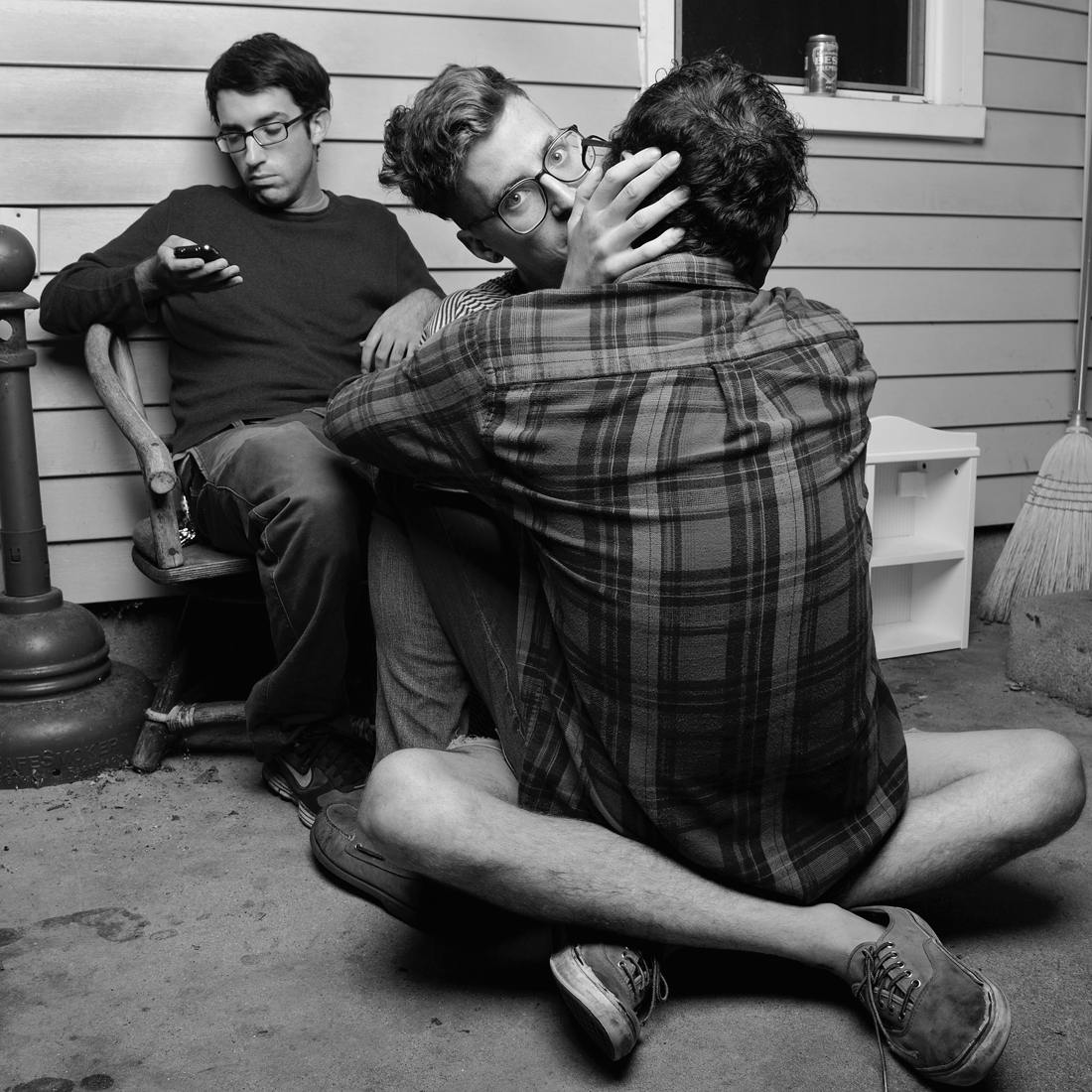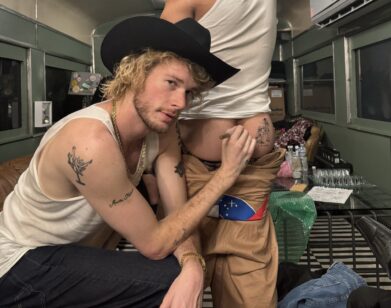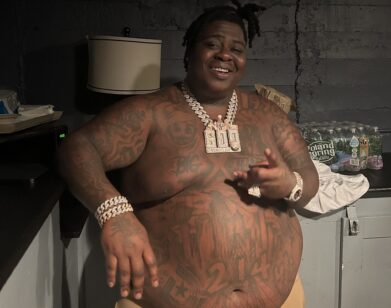Jamaican Queens’ Food for Thought

ABOVE: JAMAICAN QUEENS. IMAGE COURTESY OF ANDI HEDRICK
Ten a.m. on a Wednesday morning is not the optimal time to interview a musician. Ryan Spencer, singer and one-fourth of the self-proclaimed “trap-pop” group Jamaican Queens, mumbles a few groggy words into the phone receiver. “I just woke up. I’m still in bed while talking to you.” At least he’s honest.
His mood starts off sluggish and sleepy, but Spencer’s cadence picks up when the conversation turns to Detroit, his and the band’s current home base. Not even a year old, Jamaican Queens can thank the city’s low rent and odd jobs for their quickly building buzz. Founded originally as a duo, Spencer and producer/guitarist Adam Pressley left their former band, Prussia, in pursuit of a more intimate music-making experience. By working only the occasional handful of hours a week, just enough to scrape by, the pair wrote and recorded an album in only a few months. The result was Wormfood, released earlier this month (from which we premiered a single, “Caitlin,” in March).
Lyrically, the album flirts with the heaviness of love, despair, and, most prevalently and morbidly, loss. Musically, it dips into a mélange of genres, ranging from Southern hip-hop beats to melodies reminiscent of Morrissey and Brian Eno, all slathered with a thorough helping of candy-coated pop—certainly no easy feat.
CHELSEA BURCZ: What’s the weather like in Detroit right now?
RYAN SPENCER: It snowed here on Saturday, but it looks like it’s getting nicer. I think it’s finally going to be spring in Detroit.
BURCZ: I’ve never been to Detroit. What are the best and worst parts about it?
SPENCER: The worst part is the sports fans that come and treat the city like a garbage can for their plastic Bud Light bottles. The bulk of the ticket holders aren’t from the city, it’s mostly white-collar people from the suburbs, and then they come here and exploit the city for what it is, they eat at the cafés they read about in The New York Times. They get really drunk and tailgate, you can’t park anywhere, and then they leave. That’s the worst part about Detroit. That and putting “the club” on your car’s steering wheel, or else it gets stolen.
The best part is there’s a lot of really cool Mexican restaurants in Mexicantown, and you can get the most amazing cheap foods. I’m really addicted to them. It’s like heroin to me to eat at these Mexican restaurants.
BURCZ: I’ve read your beats were originally created for a rapper, and that he didn’t use them, so you did. How does your songwriting process work with so many elements?
SPENCER: When Adam moved to Detroit, we were in a band with four other guys. He came here to be in that band, but [a member in the band] got really addicted to heroin and pawned all of Adam’s music equipment. While they were breaking up, Adam had shown me a lot of the mixes he was making on the side with this rapper in Illinois. I had a CD of those instrumental tracks in my car and when I worked for this lawyer in Detroit (who was also a slumlord), I would drive around listening to it. I had to drive to all of his properties on the east and west sides, these really dangerous neighborhoods, and I would have to read their water meters and try to get their gas turned on for Section 8 housing. A year ago we started recording the album that came out last month.
BURCZ: So things moved fast for you guys…
SPENCER: Yeah, extremely fast musically. Adam doesn’t really work, except that he runs an event called “Auto-Tune Karaoke” at a bar once a week and makes everyone sound like T-Pain. That’s his only source of income. And then I have no source of income at all, besides music, except that I run a Twitter for a local venue and they pay while I’m away on the road. It’s easier for things to move fast when you spend all of your time on it.
BURCZ: Besides rap, what other influences do you guys look to? I’m sure I’m not the first person to say that your track “Water” sounds like Brian Eno’s “Baby’s On Fire”…
SPENCER: I’m glad you brought up the Brian Eno thing, because I purposely took that melody because I thought it was so strong. Brian Eno is the master of creating challenging music, with having the simplest pop melodies on top of very abstract avant-garde background. I love that idea.
BURCZ: Your album is titled Wormfood, and it seems like death is a theme in a lot of the lyrics. I’m thinking of the imagery in “Kids Get Away” video and the blood on the album cover. What’s so cool about death?
SPENCER: [laughs] I don’t think there’s anything cool about death. I think it’s just the final thing that you do, and it’s the only thing you’re guaranteed you’re going to do. The reason why we called it Wormfood, is because I was working in a café with a bunch of melodramatic 20somethings that were all only working six to 12 hours a week, and all had horrible relationships, and were all artists or musicians.
BURCZ: Wait, like an episode of Girls?
SPENCER: Yeah! It was exactly like Girls. And we would make all these morbid jokes about suicide. Not because suicide is funny, I’ve had about four friends who committed suicide, I went to a lot of funerals when I was younger. But it was kind of a way to make light of the most depressing thing a person can go through. That’s it. Once you’re gone, you’re just dead. The people who are affected are the people around you. So we used to joke, “Well, at least you’re wormfood.” So then we would just say “wormfood” all the time because we couldn’t really have four servers making morbid jokes about suicide while working.
Then the girl who’s on the front cover, she sent me a sad voicemail. It’s that lullaby that’s the fifth track on the Wormfood album, it separates the poppy songs from the darker songs. I thought it was really beautiful, so I sent it to Adam. Adam made the track later that day, and then it ended up becoming the name of the album.
BURCZ: Did you always want to be a musician, or did you ever have anything else in mind?
SPENCER: I went to college for marketing and economics. I graduated with a degree and got a job right away, and after three months I knew I could never work a nine-to-five or in the marketing field ever again. It made me so cynical. At the end of the day, when I would go home to work on music, I would be so burnt out, both physically and emotionally, from this guy who was using his life’s work to take advantage of people. After a while I had to tell him to fuck himself forever, and then I got a job at that café and moved to a really cheap house. Now I know I can only be a musician, unfortunately for my bank account and my parents. Though, I really did love Guns N’ Roses growing up, I wanted to be like Slash. Even though now I don’t play guitar, and I don’t have long hair, and I’m very rarely shirtless in front of a church, and I don’t own any leather. I’ll get there.
BURCZ: Have you guys been playing with Mykki Blanco? Or are you going to be?
SPENCER: We are playing with Mykki Blanco tonight. When I first heard that “Wavvy” song I was like, “Shit, rap is getting so cool”—and I was so obsessed with it. I called our agent and said we really wanted to play with Mykki Blanco. That whole he/she thing with Mykki Blanco, it gets people talking. It’s kind of how we are when we describe ourselves as “trap-pop.” People are always wondering, “What’s that?”
BURCZ: What do you hope your audience takes away from your music when they hear it?
SPENCER: I want people to be excited after they hear the music. And if they take away the sincerity and honesty in it, or can relate to some of that, because it’s pretty forthright and I feel like people can relate to it if they’ve ever gone through the things that I’m talking about.
JAMAICAN QUEENS’ WORMFOOD IS OUT NOW. THE BAND WILL PLAY BROOKLYN BOWL WITH JAVELIN TOMORROW. FOR MORE ON THE BAND, PLEASE VISIT ITS WEBSITE.






